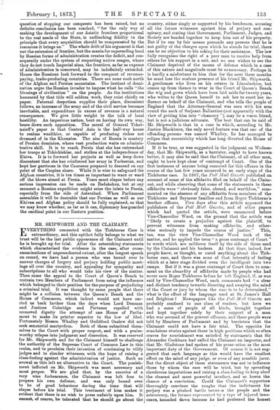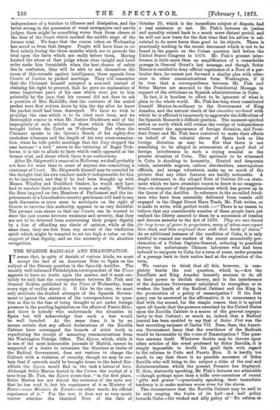MR SKHDWORTH AND THE CLAIMANT. IlVERYTHING connected with the Tichborne
Casa is
i r extraordinary, and this epithet fully belongs to what we trust will be the last public appearance of the Claimant until he is brought up for trial. After the astonishing statements which characterised the evidence in the case, after cross- examinations of unprecedented extent, after the longest speech on record, we have had a person who was bound over to answer charges of forgery and perjury holding public meet- ings all over the country, and appealing for sympathy and subscriptions to all who would take his view of the matter. Then came the appeal to the Court of Queen's Bench to restrain two Members of Parliament from using the influence which belonged to their position for the purpose of prejudicing a criminal trial. It was thought by some people that there might be a collision between the Queen's Bench and the House of Commons, which indeed would not have car- ried us back farther than the days when Lord Denman and Justices Coleridge and Patteson repelled with unmoved dignity the attempt of one House of Parlia- ment to make its printer superior to the law of libel. Fortunately Messrs. Whalley and Guildford Onelow did not seek senatorial martyrdom. Both of them submitted them- selves to the Court with proper respect, and with a praise- worthy relapse into judgment and discretion. It was reserved for Mr. Skipworth and for the Claimant himself to challenge the authority of the Supreme Court of Common Law in this realm, and to proclaim their intention of continuing to vilify judges and to slander witnesses, with the hope of raising a class-feeling against the administration of justice. Such an avowal as this left no alternative to the Court. The punish- ment inflicted on Mr. Skipworth was most necessary and most proper. We are glad that, by the exercise of a very wise forbearance, the Claimant was left free to prepare his own defence, and was only bound over to be of good behaviour during the time that will elapse before his trial. This treatment of him makes it evident that there is no wish to press unfairly upon him. It cannot, of course, be tolerated that he should go about the
country, either singly or supported by his bondsmen, accusing all the future witnesses against him of perjury and con- spiracy, and stating that Government, Parliament, Judges, and Society are banded together to keep him out of his property. But if he can by fair means persuade any persons that he is. not guilty of the charges upon which he stands for trial, there can be no objection to his asking for their assistanoe. The law fully recognises the right of a poor man to receive help from others for his support in a suit, and no one wishes to see the Claimant deprived of the means of defence which in a case of this nature and magnitude must be so necessary. Perhaps it . is hardly a misfortune to him that for the next three months he must lose the zealous presence of his friend Mr. Skipworth. A gentleman who lives on his estates in Lincolnshire, but comes up from thence to wear in the Court of Queen's Bench the wig and gown which have been laid aside for twenty years, who writes to the Queen herself to ask her to exert her in- fluence on behalf of the Claimant, and who tells the people of England that the Attorney-General was seen with his arm round the neck of Serjeant Ballantine (not apparently with the view of getting him into "chancery "), may be a warm friend, but is not a judicious advocate. The best that can be said of Mr. Skipworth is that in a case in which, according to Mr. Justice Blackburn, the only novel feature was that one of the offending persons was named Whalley, ne has managed to eclipse that eccentricity which has long diverted the House of Commons.
If it be true, as was suggested in the judgment on Wednes- day, that Mr. Skipwoith, as a barrister, ought to have known better, it may also be said that the Claimant, of all other men, ought to have kept clear of contempt of Court. One of the first instances of anyone being censured for this offence in the course of the last few years occurred in an early stage of the Tichborne case. In 1867, the Pall Mall Gazette published an account of some of the affidavits filed on behalf of the Claim- ant, and while observing that some of the statements in these affidavits were "obviously false, absurd, and worthless," com- mented on the absence of any affidavits from members of the Tichborne and Seymour families and from Roger Tichborne's brother officers. Five days after this article appeared the publishers of the Pall Mall Gazette, and of other papers which had quoted the article, were summoned before Vice-Chancellor Wood, on the ground that the article was "likely to create a prejudice against the plaintiff, to prevent witnesses from making affidavits, and other- wise seriously to impede the course of justice." This, too, was the view Vice-Chancellor Wood took of the matter, and he applied the term" a gross contempt of Court " to words which are mildness itself by the side of those used by the Claimant and his backers. At that time, indeed, few people knew, or thought, or cared anything about the Tich- -borne case, and there was none of that intensity of feeling which at a later stage divided even the intelligent into two camps. But if it was a gross contempt of Court then to com- ment on the absurdity of affidavits made by people who had never seen Roger Tichborne before he left England, if, as was said by Vice-Chancellor Wood, such comments had "a clear and distinct tendency towards directing and swaying the mind of the Court or jury by whom the case is to be determined," what is the effect of the language used at St. James's Hall and Brighton ? Newspapers like the Pall Mall Gazette are probably confined to one class of readers, but here we had a mass of people of all kinds, brought together and kept together solely by their support of a man who was accused of the gravest offences, and these people were told by Members of Parliament and by barristers that the Claimant could not have a fair trial. The appetite for scandalous stories against those in high positions which so often craves for nourishment was satisfied by statements that Sir Alexander Cockburn had called the Claimant an impostor, and that Mr. Gladstone had spoken of his prosecution as the most important duty of the Government. Of course it is not sug- gested that such language as this would have the smallest
effect on the mind of any judge, or even of any sensible juror. But the direct object of these statements was not to influence those by whom the case will be tried, but by spreading slanderous imputations and raising a class feeling to keep aloof the clearest and most powerful intellect, and so lessen the
chance of a conviction. Could the Claimant's supporters thoroughly convince the roughs that the indictment for perjury was a pitched battle betwe,.n the people and the aristocracy, the former represented by a type of injured inno- cence, hounded down because he had preferred the honest independence of a butcher to idleness and dissipation, and the latter strong in the possession of venal newspapers and servile judges, there might be something worse than those cheers at the door of the Court which marked the middle stage of the former trial. We hope that the course taken on Wednesday has saved us from that danger. People will have time to re- flect calmly during the three months which are to precede the trial upon the facts which are really before them. Having hushed the abuse of that judge whose clear insight and lucid order make him formidable when the best chance of safety lies in confusion, they will be able to ask themselves the cause of this crusade against intelligence, these appeals from Courts of Justice to packed meetings. They will remember that the Claimant himself accepted a non-suit instead of claiming his right to proceed, that he gave no explanation of some important parts of his case which were put to him pointedly by the jury, that his counsel did not dare to ask a question of Mrs. Radcliffe, that the contents of the sealed packet were first written down by him the day after he knew the packet itself had been destroyed. We have no wish to prejudge the case which is to be tried next term, and we thoroughly concur in what Mr. Justice Blackburn said of the impropriety of such articles as those which the Claimant brought before the Court on Wednesday. But when the Claimant speaks in the Queen's Bench of his eighty-five unshaken witnesses and the length of his own cross-examina- tion, when he tells public meetings that the Jury stopped the case because "a lord" swore to the tattooing of Roger Tich- borne, it is fair to allude to facts which really appeared at the former trial, and about which there is no controversy.
After Mr. Skipworth's removal to Holloway, we shall probably not hear for some time to come of anyone else committing a contempt of Court. Mr. Skipworth himself may be consoled by the thought that his own conduct made it indispensable for him to be imprisoned, and that if he had been brought up with Messrs. Whalley and Guildford Onslow, he would only have had to emulate their prudence to escape as easily. Whether the fines imposed on two Members of Parliament and the im- prisonment of a Lincolnshire country gentleman will lead to any such discussion as some seem to anticipate on the right of Courts to exercise this authority, appears to us very doubtful. The present case shows us that our Courts can be trusted to steer the just course between weakness and severity, that they are not to be deterred from maintaining their proper dignity by a fear of offending any shade of opinion, while at the same time, they are free from any savour of the vindictive spirit which might be tempted to set too high a value on the support of that dignity, and on the necessity of its absolute recognition.







































 Previous page
Previous page